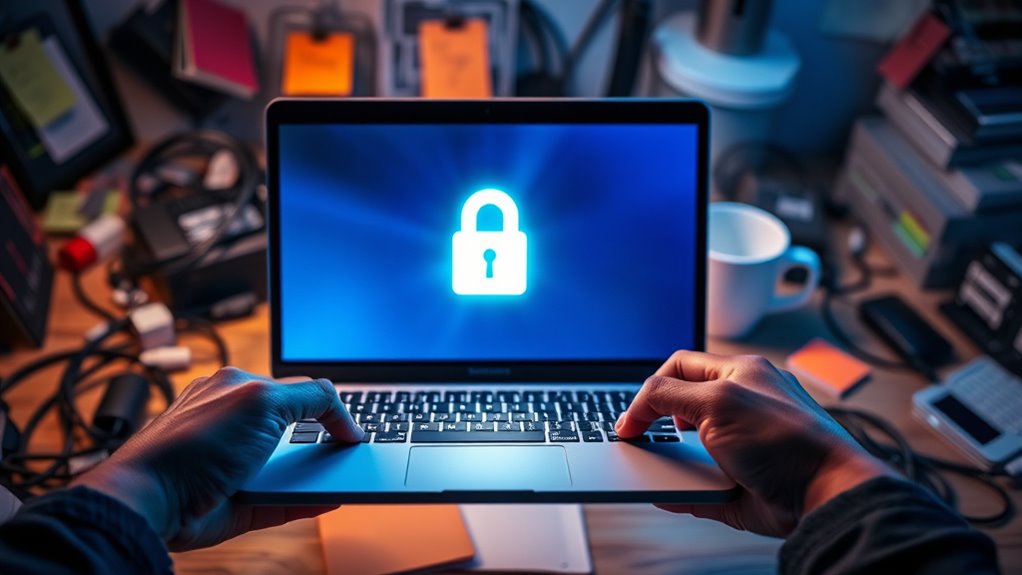Digital privacy matters more than you think because your online activities create a trail that can be exploited without you knowing. Your personal data is collected, analyzed, and used for targeted ads, identity theft, or even surveillance. Without good privacy habits, you leave yourself vulnerable to cyberattacks and breaches. Protecting your information requires understanding common myths and building routines that keep your data safe. Keep exploring to discover simple ways to strengthen your digital defenses and stay secure.
Key Takeaways
- Protecting digital privacy reduces risks of identity theft, data breaches, and targeted cyberattacks.
- Maintaining good privacy habits ensures long-term security and control over personal information.
- Understanding data collection methods helps prevent unwarranted profiling and surveillance.
- Secure practices and routines make online activities safer and less vulnerable to cybercriminals.
- Awareness of privacy basics is essential for making smarter, safer online choices today and in the future.
The Growing Importance of Digital Privacy in Daily Life

In today’s digital world, your privacy is more vulnerable than ever, and protecting it has become essential to your daily life. Every online activity you perform—whether browsing, shopping, or socializing—contributes to your digital footprint. This collection of data can reveal personal habits, preferences, and even sensitive information. Without proper awareness of data privacy, you risk exposing yourself to identity theft, targeted ads, or even government surveillance. Managing your digital footprint is vital to maintaining control over your information. The more aware you are of how your data is collected and used, the better you can safeguard your privacy. Recognizing the importance of digital privacy helps you make smarter choices online and defend yourself against potential threats. Additionally, understanding the concept of data collection methods used by various devices and platforms can empower you to take more effective privacy measures.
Common Myths and Misconceptions About Online Security

Many people believe that a strong password alone keeps their accounts safe, but that’s not enough. There’s a misconception that remaining completely anonymous online is easy, which isn’t true in most cases. You might also overestimate how much encryption can protect your data, thinking it’s foolproof when vulnerabilities still exist. Additionally, understanding dog breeds can help you recognize the importance of specific security measures tailored to different risks.
Myths About Passwords
Have you ever believed that a password must be complex and lengthy to keep your accounts safe? Many think longer passwords automatically mean better security, but that’s a myth. Here are some common misconceptions about passwords:
- Password complexity guarantees safety – it helps, but isn’t foolproof if you reuse passwords across sites.
- Using the same password everywhere is okay – it’s risky; a breach on one site can compromise all your accounts.
- Short passwords can be secure if they’re unique – length matters more than just complexity.
- Changing passwords frequently always improves security – unless you’re just creating weak variations, it might not add much.
- Trusting the system’s security measures alone is enough – understanding trust issues is vital to recognize potential vulnerabilities.
Misconceptions on Anonymity
Believing that simply using a pseudonym or avoiding your real name online keeps you fully anonymous is a common misconception. While anonymous browsing can hide your identity from some viewers, it doesn’t guarantee complete anonymity. Your activity can still be tracked through IP addresses, cookies, or browser fingerprints. Identity masking tools, like VPNs and proxy servers, can improve privacy, but they aren’t foolproof. Many assume that these methods make them untraceable, but skilled trackers can still piece together your digital footprint. True online anonymity requires multiple layers of security and awareness of how data is collected and stored. Relying solely on pseudonyms or casual privacy tools can give a false sense of security, leaving you vulnerable to data collection and surveillance. Additionally, understanding the importance of layered security approaches is crucial for truly protecting your digital privacy.
Overestimating Encryption
Is encryption the silver bullet for online security? Not quite. Many people fall into encryption overconfidence, assuming it shields them completely. This privacy overestimation can lead to dangerous complacency. Here are four misconceptions to watch out for:
- Encrypted messaging is invulnerable – hackers and governments can still access data through other methods.
- Encryption guarantees complete privacy – metadata, device vulnerabilities, and leaks can still expose your info.
- All encryption is unbreakable – some encryption algorithms are outdated or poorly implemented.
- Using encryption means you’re fully protected – encryption is just one layer; other security practices matter too.
- Relying solely on encryption overlooks Vetted – Grobal World and other essential security measures.
Understanding these limits helps you avoid false security and better protect your digital privacy.
How Personal Data Is Collected and Used

Ever wonder how your personal data ends up in the hands of companies? It’s often collected through your online activities—shopping, browsing, social media—and then sold to data brokers. These intermediaries compile your information into detailed profiles, which companies use for targeted advertising. When you click on an ad or visit a website, your data is analyzed to predict what you might want next. This process helps advertisers deliver personalized messages, but it also means your habits, preferences, and even sensitive details are constantly tracked and used without your explicit consent. Understanding the characteristics of a healthy breakfast can help you make better dietary choices and improve your overall well-being. By understanding how your data is collected and used, you can better grasp why protecting your personal information is so vital in today’s digital world.
Simple Steps to Protect Your Online Information

To better protect your online information, taking simple, proactive steps can make a big difference. First, always use strong, unique passwords for your accounts and consider a password manager. Second, enable data encryption on your devices and communication apps to keep your information secure. Third, regularly review privacy policies to understand how your data is used and shared. Fourth, be cautious when sharing personal details online, especially on social media. These small actions help safeguard your data and reduce exposure to breaches. Remember, understanding privacy policies guarantees you’re aware of your rights and protections. Additionally, utilizing cookies responsibly can enhance your browsing experience while maintaining your privacy. By staying vigilant and informed, you take control of your digital privacy and make it harder for others to access your sensitive information.
The Risks of Ignoring Digital Privacy Practices

Ignoring digital privacy practices can expose you to serious risks, such as identity theft, financial loss, and unauthorized access to your personal information. Data breaches are increasingly common and can leak sensitive details, leaving you vulnerable. When your data falls into the wrong hands, identity thieves can steal your identity, open accounts, or make fraudulent purchases in your name. This can ruin your credit and take years to resolve. Without proper privacy measures, you also risk hacking and surveillance, which compromise your personal security. The consequences are significant, and the impact can last for years. Protecting your digital privacy isn’t just about avoiding inconvenience; it’s about safeguarding your financial stability and peace of mind. Ignoring these risks puts you at unnecessary danger. Additionally, failing to implement basic digital privacy practices can make you an easier target for cybercriminals seeking vulnerable victims.
Building Habits for Long-Term Data Security

Developing consistent habits is key to maintaining long-term data security. Habit formation guarantees you regularly practice protection techniques, making secure behaviors automatic over time. To build these habits, start with simple steps: 1. Use strong, unique passwords for each account. 2. Enable two-factor authentication whenever possible. 3. Regularly update your devices and apps. 4. Be cautious about sharing personal info online. Paying attention to cybersecurity trends can help you stay ahead of emerging threats and reinforce your habits.
Frequently Asked Questions
How Can I Tell if My Digital Privacy Has Been Compromised?
You can tell if your digital privacy has been compromised by noticing unusual activity, like strange login alerts or password changes. Stay aware of encryption methods used on your accounts and devices—weak encryption can be a red flag. Conduct regular privacy audits to review access permissions and data sharing. If you spot inconsistencies or unauthorized activity, act quickly to secure your information and protect your digital privacy.
Are Free VPNS Effective for Protecting My Online Privacy?
Free VPNs often claim to protect your privacy, but their effectiveness isn’t guaranteed. They might log your data, sell it to third parties, or have weak security features. While they seem appealing, relying on free VPNs can give you a false sense of security. Instead, seek reputable paid options that genuinely prioritize your privacy, encrypt your data, and have transparent privacy claims to keep you safer online.
What Legal Rights Do I Have Regarding My Personal Data?
You have legal rights regarding your personal data, including access, correction, deletion, and data portability, under laws like GDPR and CCPA. These laws protect your data from misuse and ensure transparency. You can request companies to disclose what data they hold, correct inaccuracies, or delete your information. Stay informed about your rights, and don’t hesitate to exercise them to maintain control over your personal data and enhance your privacy online.
How Do Companies Monetize My Online Activity Without My Consent?
You might think your online activity is private, but companies monetize it through data broker practices and targeted advertising. They collect your data without explicit consent, then sell or share it with third parties who use it to craft personalized ads. This way, your online behavior generates revenue for them, often without you realizing it. Protecting your digital privacy helps you control how your data is used and who profits from it.
Can Digital Privacy Tools Protect Me From Identity Theft?
Digital privacy tools can definitely help protect you from identity theft. Using encryption techniques secures your data, making it harder for hackers to access sensitive information. Additionally, strong password management ensures you don’t reuse passwords or choose weak ones, reducing your risk. Together, these tools create a shield around your personal info, making it much more difficult for cybercriminals to steal your identity and misuse your data.
Conclusion
Digital privacy isn’t just a buzzword—it’s your safeguard in an increasingly connected world. By understanding how your data is used and taking simple steps to protect it, you can stay one step ahead of threats. Don’t wait for a breach to realize its importance. Are you willing to risk losing your personal information? Prioritize your privacy today, and build habits that keep your online world safe for the long haul.










